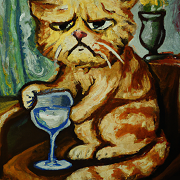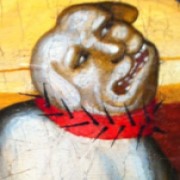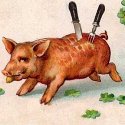|
Mozi posted:ishmael and queequeg sittin in a tree Hell yeah
|
|
|
|

|
| # ? Apr 26, 2024 07:59 |
|
just lol at people whose lives are so cozy and secure that they have goddamn ennui when everyone else is suffering from existential dread
|
|
|
|
I prefer nihilistic stupor
|
|
|
|
Big anhedonia fan here
|
|
|
|
I quickly followed suit, and descending into the bar-room accosted the grinning landlord very pleasantly. I cherished no malice towards him, though he had been skylarking with me not a little in the matter of my bedfellow. However, a good laugh is a mighty good thing, and rather too scarce a good thing; the more’s the pity. So, if any one man, in his own proper person, afford stuff for a good joke to anybody, let him not be backward, but let him cheerfully allow himself to spend and be spent in that way. And the man that has anything bountifully laughable about him, be sure there is more in that man than you perhaps think for. The bar-room was now full of the boarders who had been dropping in the night previous, and whom I had not as yet had a good look at. They were nearly all whalemen; chief mates, and second mates, and third mates, and sea carpenters, and sea coopers, and sea blacksmiths, and harpooneers, and ship keepers; a brown and brawny company, with bosky beards; an unshorn, shaggy set, all wearing monkey jackets for morning gowns. You could pretty plainly tell how long each one had been ashore. This young fellow’s healthy cheek is like a sun-toasted pear in hue, and would seem to smell almost as musky; he cannot have been three days landed from his Indian voyage. That man next him looks a few shades lighter; you might say a touch of satin wood is in him. In the complexion of a third still lingers a tropic tawn, but slightly bleached withal; he doubtless has tarried whole weeks ashore. But who could show a cheek like Queequeg? which, barred with various tints, seemed like the Andes’ western slope, to show forth in one array, contrasting climates, zone by zone. “Grub, ho!” now cried the landlord, flinging open a door, and in we went to breakfast. They say that men who have seen the world, thereby become quite at ease in manner, quite self-possessed in company. Not always, though: Ledyard, the great New England traveller, and Mungo Park, the Scotch one; of all men, they possessed the least assurance in the parlor. But perhaps the mere crossing of Siberia in a sledge drawn by dogs as Ledyard did, or the taking a long solitary walk on an empty stomach, in the negro heart of Africa, which was the sum of poor Mungo’s performances—this kind of travel, I say, may not be the very best mode of attaining a high social polish. Still, for the most part, that sort of thing is to be had anywhere. These reflections just here are occasioned by the circumstance that after we were all seated at the table, and I was preparing to hear some good stories about whaling; to my no small surprise, nearly every man maintained a profound silence. And not only that, but they looked embarrassed. Yes, here were a set of sea-dogs, many of whom without the slightest bashfulness had boarded great whales on the high seas—entire strangers to them—and duelled them dead without winking; and yet, here they sat at a social breakfast table—all of the same calling, all of kindred tastes—looking round as sheepishly at each other as though they had never been out of sight of some sheepfold among the Green Mountains. A curious sight; these bashful bears, these timid warrior whalemen! But as for Queequeg—why, Queequeg sat there among them—at the head of the table, too, it so chanced; as cool as an icicle. To be sure I cannot say much for his breeding. His greatest admirer could not have cordially justified his bringing his harpoon into breakfast with him, and using it there without ceremony; reaching over the table with it, to the imminent jeopardy of many heads, and grappling the beefsteaks towards him. But that was certainly very coolly done by him, and every one knows that in most people’s estimation, to do anything coolly is to do it genteelly. We will not speak of all Queequeg’s peculiarities here; how he eschewed coffee and hot rolls, and applied his undivided attention to beefsteaks, done rare. Enough, that when breakfast was over he withdrew like the rest into the public room, lighted his tomahawk-pipe, and was sitting there quietly digesting and smoking with his inseparable hat on, when I sallied out for a stroll.
|
|
|
|
If I had been astonished at first catching a glimpse of so outlandish an individual as Queequeg circulating among the polite society of a civilized town, that astonishment soon departed upon taking my first daylight stroll through the streets of New Bedford. In thoroughfares nigh the docks, any considerable seaport will frequently offer to view the queerest looking nondescripts from foreign parts. Even in Broadway and Chestnut streets, Mediterranean mariners will sometimes jostle the affrighted ladies. Regent Street is not unknown to Lascars and Malays; and at Bombay, in the Apollo Green, live Yankees have often scared the natives. But New Bedford beats all Water Street and Wapping. In these last-mentioned haunts you see only sailors; in New Bedford, actual cannibals stand chatting at street corners; savages outright; many of whom yet carry on their bones unholy flesh. It makes a stranger stare. But, besides the Feegeeans, Tongatobooarrs, Erromanggoans, Pannangians, and Brighggians, and, besides the wild specimens of the whaling-craft which unheeded reel about the streets, you will see other sights still more curious, certainly more comical. There weekly arrive in this town scores of green Vermonters and New Hampshire men, all athirst for gain and glory in the fishery. They are mostly young, of stalwart frames; fellows who have felled forests, and now seek to drop the axe and snatch the whale-lance. Many are as green as the Green Mountains whence they came. In some things you would think them but a few hours old. Look there! that chap strutting round the corner. He wears a beaver hat and swallow-tailed coat, girdled with a sailor-belt and a sheath-knife. Here comes another with a sou’-wester and a bombazine cloak. No town-bred dandy will compare with a country-bred one- I mean a downright bumpkin dandy- a fellow that, in the dog-days, will mow his two acres in buckskin gloves for fear of tanning his hands. Now when a country dandy like this takes it into his head to make a distinguished reputation, and joins the great whale-fishery, you should see the comical things he does upon reaching the seaport. In bespeaking his sea-outfit, he orders bell-buttons to his waistcoats; straps to his canvas trowsers. Ah, poor Hay-Seed! how bitterly will burst those straps in the first howling gale, when thou art driven, straps, buttons, and all, down the throat of the tempest. But think not that this famous town has only harpooneers, cannibals, and bumpkins to show her visitors. Not at all. Still New Bedford is a queer place. Had it not been for us whalemen, that tract of land would this day perhaps have been in as howling condition as the coast of Labrador. As it is, parts of her back country are enough to frighten one, they look so bony. The town itself is perhaps the dearest place to live in, in all New England. It is a land of oil, true enough: but not like Canaan; a land, also, of corn and wine. The streets do not run with milk; nor in the spring-time do they pave them with fresh eggs. Yet, in spite of this, nowhere in all America will you find more patrician-like houses; parks and gardens more opulent, than in New Bedford. Whence came they? how planted upon this once scraggy scoria of a country? Go and gaze upon the iron emblematical harpoons round yonder lofty mansion, and your question will be answered. Yes; all these brave houses and flowery gardens came from the Atlantic, Pacific, and Indian oceans. One and all, they were harpooned and dragged up hither from the bottom of the sea. Can Herr Alexander perform a feat like that? In New Bedford, fathers, they say, give whales for dowers to their daughters, and portion off their nieces with a few porpoises a-piece. You must go to New Bedford to see a brilliant wedding; for, they say, they have reservoirs of oil in every house, and every night recklessly burn their lengths in spermaceti candles. In summer time, the town is sweet to see; full of fine maples- long avenues of green and gold. And in August, high in air, the beautiful and bountiful horse-chestnuts, candelabra-wise, proffer the passer-by their tapering upright cones of congregated blossoms. So omnipotent is art; which in many a district of New Bedford has superinduced bright terraces ot flowers upon the barren refuse rocks thrown aside at creation’s final day. And the women of New Bedford, they bloom like their own red roses. But roses only bloom in summer; whereas the fine carnation of their cheeks is perennial as sunlight in the seventh heavens. Elsewhere match that bloom of theirs, ye cannot, save in Salem, where they tell me the young girls breathe such musk, their sailor sweethearts smell them miles off shore, as though they were drawing nigh the odorous Moluccas instead of the Puritanic sands.
|
|
|
|
yeah sounds like he wants to gently caress queequeeg
|
|
|
|
Nope Next question please
|
|
|
|
SHISHKABOB posted:I should probably read this book. Free on Project Gutenberg! http://www.gutenberg.org/ebooks/2701 It's a pretty dense read but worth it. It's semi-autobiographical and he tends to get into the weeds talking about the nuts and bolts of 1800s whaling for pages at a time but it's also pretty interesting stuff that hadn't really been comprehensively written down until then.
|
|
|
|
Better watch the intense movie
|
|
|
|
Yaldabaoth posted:just lol at people whose lives are so cozy and secure that they have goddamn ennui when everyone else is suffering from existential dread What do I feel? In a word.... Limerence.
|
|
|
|
Mozi posted:ishmael and queequeg sittin in a tree would you say that you ship them
|
|
|
|
I love Moby Dick and the long period rambling about whaling and poo poo was actually super interesting to me alas I did not love Moby's Dick as it was too vegan and electronic
|
|
|
|
Empty Sandwich posted:would you say that you ship them Upon espying the sight I could not help but remark "Good heavens, Queequeg, I thought that white whale had a magnificent dork, but that is something else!" The rest of his toilet was soon achieved.
|
|
|
|
Mozi posted:Upon espying the sight I could not help but remark "Good heavens, Queequeg, I thought that white whale had a magnificent dork, but that is something else!" wait'll we get to what kind of whales they are
|
|
|
|
I dreamed a dream, the other night Lowlands, lowlands away....
|
|
|
|
mods, merge this thread with the white whale thread
|
|
|
|
I like the part where the one guy skins the whales dick and wears the dick skin as a raincoat while he's crawling around in the whale guts
|
|
|
|
Holloa!
|
|
|
|
In this same New Bedford there stands a Whaleman’s Chapel, and few are the moody fishermen, shortly bound for the Indian Ocean or Pacific, who fail to make a Sunday visit to the spot. I am sure that I did not. Returning from my first morning stroll, I again sallied out upon this special errand. The sky had changed from clear, sunny cold, to driving sleet and mist. Wrapping myself in my shaggy jacket of the cloth called bearskin, I fought my way against the stubborn storm. Entering, I found a small scattered congregation of sailors, and sailors’ wives and widows. A muffled silence reigned, only broken at times by the shrieks of the storm. Each silent worshipper seemed purposely sitting apart from the other, as if each silent grief were insular and incommunicable. The chaplain had not yet arrived; and there these silent islands of men and women sat steadfastly eyeing several marble tablets, with black borders, masoned into the wall on either side the pulpit. Three of them ran something like the following, but I do not pretend to quote:— SACRED TO THE MEMORY OF JOHN TALBOT, Who, at the age of eighteen, was lost overboard, Near the Isle of Desolation, off Patagonia, November 1st, 1836. THIS TABLET Is erected to his Memory BY HIS SISTER. SACRED TO THE MEMORY OF ROBERT LONG, WILLIS ELLERY, NATHAN COLEMAN, WALTER CANNY, SETH MACY, AND SAMUEL GLEIG, Forming one of the boats’ crews OF THE SHIP ELIZA Who were towed out of sight by a Whale, On the Off-shore Ground in the PACIFIC, December 31st, 1839. THIS MARBLE Is here placed by their surviving SHIPMATES. SACRED TO THE MEMORY OF The late CAPTAIN EZEKIEL HARDY, Who in the bows of his boat was killed by a Sperm Whale on the coast of Japan, August 3d, 1833. THIS TABLET Is erected to his Memory BY HIS WIDOW. Shaking off the sleet from my ice-glazed hat and jacket, I seated myself near the door, and turning sideways was surprised to see Queequeg near me. Affected by the solemnity of the scene, there was a wondering gaze of incredulous curiosity in his countenance. This savage was the only person present who seemed to notice my entrance; because he was the only one who could not read, and, therefore, was not reading those frigid inscriptions on the wall. Whether any of the relatives of the seamen whose names appeared there were now among the congregation, I knew not; but so many are the unrecorded accidents in the fishery, and so plainly did several women present wear the countenance if not the trappings of some unceasing grief, that I feel sure that here before me were assembled those, in whose unhealing hearts the sight of those bleak tablets sympathetically caused the old wounds to bleed afresh. Oh! ye whose dead lie buried beneath the green grass; who standing among flowers can say—here, here lies my beloved; ye know not the desolation that broods in bosoms like these. What bitter blanks in those black-bordered marbles which cover no ashes! What despair in those immovable inscriptions! What deadly voids and unbidden infidelities in the lines that seem to gnaw upon all Faith, and refuse resurrections to the beings who have placelessly perished without a grave. As well might those tablets stand in the cave of Elephanta as here. In what census of living creatures, the dead of mankind are included; why it is that a universal proverb says of them, that they tell no tales, though containing more secrets than the Goodwin Sands; how it is that to his name who yesterday departed for the other world, we prefix so significant and infidel a word, and yet do not thus entitle him, if he but embarks for the remotest Indies of this living earth; why the Life Insurance Companies pay death-forfeitures upon immortals; in what eternal, unstirring paralysis, and deadly, hopeless trance, yet lies antique Adam who died sixty round centuries ago; how it is that we still refuse to be comforted for those who we nevertheless maintain are dwelling in unspeakable bliss; why all the living so strive to hush all the dead; wherefore but the rumor of a knocking in a tomb will terrify a whole city. All these things are not without their meanings. But Faith, like a jackal, feeds among the tombs, and even from these dead doubts she gathers her most vital hope. It needs scarcely to be told, with what feelings, on the eve of a Nantucket voyage, I regarded those marble tablets, and by the murky light of that darkened, doleful day read the fate of the whalemen who had gone before me. Yes, Ishmael, the same fate may be thine. But somehow I grew merry again. Delightful inducements to embark, fine chance for promotion, it seems—aye, a stove boat will make me an immortal by brevet. Yes, there is death in this business of whaling—a speechlessly quick chaotic bundling of a man into Eternity. But what then? Methinks we have hugely mistaken this matter of Life and Death. Methinks that what they call my shadow here on earth is my true substance. Methinks that in looking at things spiritual, we are too much like oysters observing the sun through the water, and thinking that thick water the thinnest of air. Methinks my body is but the lees of my better being. In fact take my body who will, take it I say, it is not me. And therefore three cheers for Nantucket; and come a stove boat and stove body when they will, for stave my soul, Jove himself cannot.
|
|
|
|
I had not been seated very long ere a man of a certain venerable robustness entered; immediately as the storm-pelted door flew back upon admitting him, a quick regardful eyeing of him by all the congregation, sufficiently attested that this fine old man was the chaplain. Yes, it was the famous Father Mapple, so called by the whalemen, among whom he was a very great favourite. He had been a sailor and a harpooneer in his youth, but for many years past had dedicated his life to the ministry. At the time I now write of, Father Mapple was in the hardy winter of a healthy old age; that sort of old age which seems merging into a second flowering youth, for among all the fissures of his wrinkles, there shone certain mild gleams of a newly developing bloom—the spring verdure peeping forth even beneath February’s snow. No one having previously heard his history, could for the first time behold Father Mapple without the utmost interest, because there were certain engrafted clerical peculiarities about him, imputable to that adventurous maritime life he had led. When he entered I observed that he carried no umbrella, and certainly had not come in his carriage, for his tarpaulin hat ran down with melting sleet, and his great pilot cloth jacket seemed almost to drag him to the floor with the weight of the water it had absorbed. However, hat and coat and overshoes were one by one removed, and hung up in a little space in an adjacent corner; when, arrayed in a decent suit, he quietly approached the pulpit. Like most old fashioned pulpits, it was a very lofty one, and since a regular stairs to such a height would, by its long angle with the floor, seriously contract the already small area of the chapel, the architect, it seemed, had acted upon the hint of Father Mapple, and finished the pulpit without a stairs, substituting a perpendicular side ladder, like those used in mounting a ship from a boat at sea. The wife of a whaling captain had provided the chapel with a handsome pair of red worsted man-ropes for this ladder, which, being itself nicely headed, and stained with a mahogany colour, the whole contrivance, considering what manner of chapel it was, seemed by no means in bad taste. Halting for an instant at the foot of the ladder, and with both hands grasping the ornamental knobs of the man-ropes, Father Mapple cast a look upwards, and then with a truly sailor-like but still reverential dexterity, hand over hand, mounted the steps as if ascending the main-top of his vessel. The perpendicular parts of this side ladder, as is usually the case with swinging ones, were of cloth-covered rope, only the rounds were of wood, so that at every step there was a joint. At my first glimpse of the pulpit, it had not escaped me that however convenient for a ship, these joints in the present instance seemed unnecessary. For I was not prepared to see Father Mapple after gaining the height, slowly turn round, and stooping over the pulpit, deliberately drag up the ladder step by step, till the whole was deposited within, leaving him impregnable in his little Quebec. I pondered some time without fully comprehending the reason for this. Father Mapple enjoyed such a wide reputation for sincerity and sanctity, that I could not suspect him of courting notoriety by any mere tricks of the stage. No, thought I, there must be some sober reason for this thing; furthermore, it must symbolize something unseen. Can it be, then, that by that act of physical isolation, he signifies his spiritual withdrawal for the time, from all outward worldly ties and connexions? Yes, for replenished with the meat and wine of the word, to the faithful man of God, this pulpit, I see, is a self-containing stronghold—a lofty Ehrenbreitstein, with a perennial well of water within the walls. But the side ladder was not the only strange feature of the place, borrowed from the chaplain’s former sea-farings. Between the marble cenotaphs on either hand of the pulpit, the wall which formed its back was adorned with a large painting representing a gallant ship beating against a terrible storm off a lee coast of black rocks and snowy breakers. But high above the flying scud and dark-rolling clouds, there floated a little isle of sunlight, from which beamed forth an angel’s face; and this bright face shed a distinct spot of radiance upon the ship’s tossed deck, something like that silver plate now inserted into the Victory’s plank where Nelson fell. “Ah, noble ship,” the angel seemed to say, “beat on, beat on, thou noble ship, and bear a hardy helm; for lo! the sun is breaking through; the clouds are rolling off—serenest azure is at hand.” Nor was the pulpit itself without a trace of the same sea-taste that had achieved the ladder and the picture. Its panelled front was in the likeness of a ship’s bluff bows, and the Holy Bible rested on a projecting piece of scroll work, fashioned after a ship’s fiddle-headed beak. What could be more full of meaning?—for the pulpit is ever this earth’s foremost part; all the rest comes in its rear; the pulpit leads the world. From thence it is the storm of God’s quick wrath is first descried, and the bow must bear the earliest brunt. From thence it is the God of breezes fair or foul is first invoked for favourable winds. Yes, the world’s a ship on its passage out, and not a voyage complete; and the pulpit is its prow.
|
|
|
|
Really impressed that this long form OP has appeared from 2005.
|
|
|
|
Father Mapple rose, and in a mild voice of unassuming authority ordered the scattered people to condense. “Starboard gangway, there! side away to larboard—larboard gangway to starboard! Midships! midships!” There was a low rumbling of heavy sea-boots among the benches, and a still slighter shuffling of women’s shoes, and all was quiet again, and every eye on the preacher. He paused a little; then kneeling in the pulpit’s bows, folded his large brown hands across his chest, uplifted his closed eyes, and offered a prayer so deeply devout that he seemed kneeling and praying at the bottom of the sea. This ended, in prolonged solemn tones, like the continual tolling of a bell in a ship that is foundering at sea in a fog—in such tones he commenced reading the following hymn; but changing his manner towards the concluding stanzas, burst forth with a pealing exultation and joy— “The ribs and terrors in the whale, Arched over me a dismal gloom, While all God’s sun-lit waves rolled by, And lift me deepening down to doom. “I saw the opening maw of hell, With endless pains and sorrows there; Which none but they that feel can tell— Oh, I was plunging to despair. “In black distress, I called my God, When I could scarce believe him mine, He bowed his ear to my complaints— No more the whale did me confine. “With speed he flew to my relief, As on a radiant dolphin borne; Awful, yet bright, as lightning shone The face of my Deliverer God. “My song for ever shall record That terrible, that joyful hour; I give the glory to my God, His all the mercy and the power.” Nearly all joined in singing this hymn, which swelled high above the howling of the storm. A brief pause ensued; the preacher slowly turned over the leaves of the Bible, and at last, folding his hand down upon the proper page, said: “Beloved shipmates, clinch the last verse of the first chapter of Jonah—‘And God had prepared a great fish to swallow up Jonah.’” “Shipmates, this book, containing only four chapters—four yarns—is one of the smallest strands in the mighty cable of the Scriptures. Yet what depths of the soul does Jonah’s deep sealine sound! what a pregnant lesson to us is this prophet! What a noble thing is that canticle in the fish’s belly! How billow-like and boisterously grand! We feel the floods surging over us; we sound with him to the kelpy bottom of the waters; sea-weed and all the slime of the sea is about us! But what is this lesson that the book of Jonah teaches? Shipmates, it is a two-stranded lesson; a lesson to us all as sinful men, and a lesson to me as a pilot of the living God. As sinful men, it is a lesson to us all, because it is a story of the sin, hard-heartedness, suddenly awakened fears, the swift punishment, repentance, prayers, and finally the deliverance and joy of Jonah. As with all sinners among men, the sin of this son of Amittai was in his wilful disobedience of the command of God—never mind now what that command was, or how conveyed—which he found a hard command. But all the things that God would have us do are hard for us to do—remember that—and hence, he oftener commands us than endeavors to persuade. And if we obey God, we must disobey ourselves; and it is in this disobeying ourselves, wherein the hardness of obeying God consists. “With this sin of disobedience in him, Jonah still further flouts at God, by seeking to flee from Him. He thinks that a ship made by men will carry him into countries where God does not reign, but only the Captains of this earth. He skulks about the wharves of Joppa, and seeks a ship that’s bound for Tarshish. There lurks, perhaps, a hitherto unheeded meaning here. By all accounts Tarshish could have been no other city than the modern Cadiz. That’s the opinion of learned men. And where is Cadiz, shipmates? Cadiz is in Spain; as far by water, from Joppa, as Jonah could possibly have sailed in those ancient days, when the Atlantic was an almost unknown sea. Because Joppa, the modern Jaffa, shipmates, is on the most easterly coast of the Mediterranean, the Syrian; and Tarshish or Cadiz more than two thousand miles to the westward from that, just outside the Straits of Gibraltar. See ye not then, shipmates, that Jonah sought to flee world-wide from God? Miserable man! Oh! most contemptible and worthy of all scorn; with slouched hat and guilty eye, skulking from his God; prowling among the shipping like a vile burglar hastening to cross the seas. So disordered, self-condemning is his look, that had there been policemen in those days, Jonah, on the mere suspicion of something wrong, had been arrested ere he touched a deck. How plainly he’s a fugitive! no baggage, not a hat-box, valise, or carpet-bag,—no friends accompany him to the wharf with their adieux. At last, after much dodging search, he finds the Tarshish ship receiving the last items of her cargo; and as he steps on board to see its Captain in the cabin, all the sailors for the moment desist from hoisting in the goods, to mark the stranger’s evil eye. Jonah sees this; but in vain he tries to look all ease and confidence; in vain essays his wretched smile. Strong intuitions of the man assure the mariners he can be no innocent. In their gamesome but still serious way, one whispers to the other—“Jack, he’s robbed a widow;” or, “Joe, do you mark him; he’s a bigamist;” or, “Harry lad, I guess he’s the adulterer that broke jail in old Gomorrah, or belike, one of the missing murderers from Sodom.” Another runs to read the bill that’s stuck against the spile upon the wharf to which the ship is moored, offering five hundred gold coins for the apprehension of a parricide, and containing a description of his person. He reads, and looks from Jonah to the bill; while all his sympathetic shipmates now crowd round Jonah, prepared to lay their hands upon him. Frighted Jonah trembles, and summoning all his boldness to his face, only looks so much the more a coward. He will not confess himself suspected; but that itself is strong suspicion. So he makes the best of it; and when the sailors find him not to be the man that is advertised, they let him pass, and he descends into the cabin. “‘Who’s there?’ cries the Captain at his busy desk, hurriedly making out his papers for the Customs—‘Who’s there?’ Oh! how that harmless question mangles Jonah! For the instant he almost turns to flee again. But he rallies. ‘I seek a passage in this ship to Tarshish; how soon sail ye, sir?’ Thus far the busy Captain had not looked up to Jonah, though the man now stands before him; but no sooner does he hear that hollow voice, than he darts a scrutinizing glance. ‘We sail with the next coming tide,’ at last he slowly answered, still intently eyeing him. ‘No sooner, sir?’—‘Soon enough for any honest man that goes a passenger.’ Ha! Jonah, that’s another stab. But he swiftly calls away the Captain from that scent. ‘I’ll sail with ye,’—he says,—‘the passage money how much is that?—I’ll pay now.’ For it is particularly written, shipmates, as if it were a thing not to be overlooked in this history, ‘that he paid the fare thereof’ ere the craft did sail. And taken with the context, this is full of meaning. “Now Jonah’s Captain, shipmates, was one whose discernment detects crime in any, but whose cupidity exposes it only in the penniless. In this world, shipmates, sin that pays its way can travel freely, and without a passport; whereas Virtue, if a pauper, is stopped at all frontiers. So Jonah’s Captain prepares to test the length of Jonah’s purse, ere he judge him openly. He charges him thrice the usual sum; and it’s assented to. Then the Captain knows that Jonah is a fugitive; but at the same time resolves to help a flight that paves its rear with gold. Yet when Jonah fairly takes out his purse, prudent suspicions still molest the Captain. He rings every coin to find a counterfeit. Not a forger, any way, he mutters; and Jonah is put down for his passage. ‘Point out my state-room, Sir,’ says Jonah now, ‘I’m travel-weary; I need sleep.’ ‘Thou lookest like it,’ says the Captain, ‘there’s thy room.’ Jonah enters, and would lock the door, but the lock contains no key. Hearing him foolishly fumbling there, the Captain laughs lowly to himself, and mutters something about the doors of convicts’ cells being never allowed to be locked within. All dressed and dusty as he is, Jonah throws himself into his berth, and finds the little state-room ceiling almost resting on his forehead. The air is close, and Jonah gasps. Then, in that contracted hole, sunk, too, beneath the ship’s water-line, Jonah feels the heralding presentiment of that stifling hour, when the whale shall hold him in the smallest of his bowels’ wards. “Screwed at its axis against the side, a swinging lamp slightly oscillates in Jonah’s room; and the ship, heeling over towards the wharf with the weight of the last bales received, the lamp, flame and all, though in slight motion, still maintains a permanent obliquity with reference to the room; though, in truth, infallibly straight itself, it but made obvious the false, lying levels among which it hung. The lamp alarms and frightens Jonah; as lying in his berth his tormented eyes roll round the place, and this thus far successful fugitive finds no refuge for his restless glance. But that contradiction in the lamp more and more appals him. The floor, the ceiling, and the side, are all awry. ‘Oh! so my conscience hangs in me!’ he groans, ‘straight upwards, so it burns; but the chambers of my soul are all in crookedness!’ “Like one who after a night of drunken revelry hies to his bed, still reeling, but with conscience yet pricking him, as the plungings of the Roman race-horse but so much the more strike his steel tags into him; as one who in that miserable plight still turns and turns in giddy anguish, praying God for annihilation until the fit be passed; and at last amid the whirl of woe he feels, a deep stupor steals over him, as over the man who bleeds to death, for conscience is the wound, and there’s naught to staunch it; so, after sore wrestlings in his berth, Jonah’s prodigy of ponderous misery drags him drowning down to sleep. “And now the time of tide has come; the ship casts off her cables; and from the deserted wharf the uncheered ship for Tarshish, all careening, glides to sea. That ship, my friends, was the first of recorded smugglers! the contraband was Jonah. But the sea rebels; he will not bear the wicked burden. A dreadful storm comes on, the ship is like to break. But now when the boatswain calls all hands to lighten her; when boxes, bales, and jars are clattering overboard; when the wind is shrieking, and the men are yelling, and every plank thunders with trampling feet right over Jonah’s head; in all this raging tumult, Jonah sleeps his hideous sleep. He sees no black sky and raging sea, feels not the reeling timbers, and little hears he or heeds he the far rush of the mighty whale, which even now with open mouth is cleaving the seas after him. Aye, shipmates, Jonah was gone down into the sides of the ship—a berth in the cabin as I have taken it, and was fast asleep. But the frightened master comes to him, and shrieks in his dead ear, ‘What meanest thou, O, sleeper! arise!’ Startled from his lethargy by that direful cry, Jonah staggers to his feet, and stumbling to the deck, grasps a shroud, to look out upon the sea. But at that moment he is sprung upon by a panther billow leaping over the bulwarks. Wave after wave thus leaps into the ship, and finding no speedy vent runs roaring fore and aft, till the mariners come nigh to drowning while yet afloat. And ever, as the white moon shows her affrighted face from the steep gullies in the blackness overhead, aghast Jonah sees the rearing bowsprit pointing high upward, but soon beat downward again towards the tormented deep. “Terrors upon terrors run shouting through his soul. In all his cringing attitudes, the God-fugitive is now too plainly known. The sailors mark him; more and more certain grow their suspicions of him, and at last, fully to test the truth, by referring the whole matter to high Heaven, they fall to casting lots, to see for whose cause this great tempest was upon them. The lot is Jonah’s; that discovered, then how furiously they mob him with their questions. ‘What is thine occupation? Whence comest thou? Thy country? What people? But mark now, my shipmates, the behavior of poor Jonah. The eager mariners but ask him who he is, and where from; whereas, they not only receive an answer to those questions, but likewise another answer to a question not put by them, but the unsolicited answer is forced from Jonah by the hard hand of God that is upon him. “‘I am a Hebrew,’ he cries—and then—‘I fear the Lord the God of Heaven who hath made the sea and the dry land!’ Fear him, O Jonah? Aye, well mightest thou fear the Lord God then! Straightway, he now goes on to make a full confession; whereupon the mariners became more and more appalled, but still are pitiful. For when Jonah, not yet supplicating God for mercy, since he but too well knew the darkness of his deserts,—when wretched Jonah cries out to them to take him and cast him forth into the sea, for he knew that for his sake this great tempest was upon them; they mercifully turn from him, and seek by other means to save the ship. But all in vain; the indignant gale howls louder; then, with one hand raised invokingly to God, with the other they not unreluctantly lay hold of Jonah. “And now behold Jonah taken up as an anchor and dropped into the sea; when instantly an oily calmness floats out from the east, and the sea is still, as Jonah carries down the gale with him, leaving smooth water behind. He goes down in the whirling heart of such a masterless commotion that he scarce heeds the moment when he drops seething into the yawning jaws awaiting him; and the whale shoots-to all his ivory teeth, like so many white bolts, upon his prison. Then Jonah prayed unto the Lord out of the fish’s belly. But observe his prayer, and learn a weighty lesson. For sinful as he is, Jonah does not weep and wail for direct deliverance. He feels that his dreadful punishment is just. He leaves all his deliverance to God, contenting himself with this, that spite of all his pains and pangs, he will still look towards His holy temple. And here, shipmates, is true and faithful repentance; not clamorous for pardon, but grateful for punishment. And how pleasing to God was this conduct in Jonah, is shown in the eventual deliverance of him from the sea and the whale. Shipmates, I do not place Jonah before you to be copied for his sin but I do place him before you as a model for repentance. Sin not; but if you do, take heed to repent of it like Jonah.” While he was speaking these words, the howling of the shrieking, slanting storm without seemed to add new power to the preacher, who, when describing Jonah’s sea-storm, seemed tossed by a storm himself. His deep chest heaved as with a ground-swell; his tossed arms seemed the warring elements at work; and the thunders that rolled away from off his swarthy brow, and the light leaping from his eye, made all his simple hearers look on him with a quick fear that was strange to them. There now came a lull in his look, as he silently turned over the leaves of the Book once more; and, at last, standing motionless, with closed eyes, for the moment, seemed communing with God and himself. But again he leaned over towards the people, and bowing his head lowly, with an aspect of the deepest yet manliest humility, he spake these words: “Shipmates, God has laid but one hand upon you; both his hands press upon me. I have read ye by what murky light may be mine the lesson that Jonah teaches to all sinners; and therefore to ye, and still more to me, for I am a greater sinner than ye. And now how gladly would I come down from this mast-head and sit on the hatches there where you sit, and listen as you listen, while some one of you reads me that other and more awful lesson which Jonah teaches to me, as a pilot of the living God. How being an anointed pilot-prophet, or speaker of true things, and bidden by the Lord to sound those unwelcome truths in the ears of a wicked Nineveh, Jonah, appalled at the hostility he should raise, fled from his mission, and sought to escape his duty and his God by taking ship at Joppa. But God is everywhere; Tarshish he never reached. As we have seen, God came upon him in the whale, and swallowed him down to living gulfs of doom, and with swift slantings tore him along ‘into the midst of the seas,’ where the eddying depths sucked him ten thousand fathoms down, and ‘the weeds were wrapped about his head,’ and all the watery world of woe bowled over him. Yet even then beyond the reach of any plummet—‘out of the belly of hell’—when the whale grounded upon the ocean’s utmost bones, even then, God heard the engulphed, repenting prophet when he cried. Then God spake unto the fish; and from the shuddering cold and blackness of the sea, the whale came breeching up towards the warm and pleasant sun, and all the delights of air and earth; and ‘vomited out Jonah upon the dry land;’ when the word of the Lord came a second time; and Jonah, bruised and beaten—his ears, like two sea-shells, still multitudinously murmuring of the ocean—Jonah did the Almighty’s bidding. And what was that, shipmates? To preach the Truth to the face of Falsehood! That was it! “This, shipmates, this is that other lesson; and woe to that pilot of the living God who slights it. Woe to him whom this world charms from Gospel duty! Woe to him who seeks to pour oil upon the waters when God has brewed them into a gale! Woe to him who seeks to please rather than to appal! Woe to him whose good name is more to him than goodness! Woe to him who, in this world, courts not dishonor! Woe to him who would not be true, even though to be false were salvation! Yea, woe to him who, as the great Pilot Paul has it, while preaching to others is himself a castaway!” He dropped and fell away from himself for a moment; then lifting his face to them again, showed a deep joy in his eyes, as he cried out with a heavenly enthusiasm,—“But oh! shipmates! on the starboard hand of every woe, there is a sure delight; and higher the top of that delight, than the bottom of the woe is deep. Is not the main-truck higher than the kelson is low? Delight is to him—a far, far upward, and inward delight—who against the proud gods and commodores of this earth, ever stands forth his own inexorable self. Delight is to him whose strong arms yet support him, when the ship of this base treacherous world has gone down beneath him. Delight is to him, who gives no quarter in the truth, and kills, burns, and destroys all sin though he pluck it out from under the robes of Senators and Judges. Delight,—top-gallant delight is to him, who acknowledges no law or lord, but the Lord his God, and is only a patriot to heaven. Delight is to him, whom all the waves of the billows of the seas of the boisterous mob can never shake from this sure Keel of the Ages. And eternal delight and deliciousness will be his, who coming to lay him down, can say with his final breath—O Father!—chiefly known to me by Thy rod—mortal or immortal, here I die. I have striven to be Thine, more than to be this world’s, or mine own. Yet this is nothing: I leave eternity to Thee; for what is man that he should live out the lifetime of his God?” He said no more, but slowly waving a benediction, covered his face with his hands, and so remained kneeling, till all the people had departed, and he was left alone in the place.
|
|
|
|
as an atheist, this is deeply disturbing
|
|
|
|
quote:Upon waking next morning about daylight, I found Queequeg’s arm thrown over me in the most loving and affectionate manner. You had almost thought I had been his wife. Call me "power bottom"
|
|
|
|
Is this one of those books where the author was paid by the word so he used as many words as possible to say the simplest poo poo?
|
|
|
|
On your whaling voyage, will you creep into the vagina of a live whale?
|
|
|
|
Quotey posted:i think i got a couple chapters into moby dick, or some sea voyaging book when i was younger and never got back to it. the start seemed to be ok, him looking for a boat to get on The boat is a metaphor for my dick
|
|
|
|
I really hope he gets to gently caress that whale one day
|
|
|
|
Returning to the Spouter-Inn from the Chapel, I found Queequeg there quite alone; he having left the Chapel before the benediction some time. He was sitting on a bench before the fire, with his feet on the stove hearth, and in one hand was holding close up to his face that little negro idol of his; peering hard into its face, and with a jack-knife gently whittling away at its nose, meanwhile humming to himself in his heathenish way. But being now interrupted, he put up the image; and pretty soon, going to the table, took up a large book there, and placing it on his lap began counting the pages with deliberate regularity; at every fiftieth page—as I fancied—stopping a moment, looking vacantly around him, and giving utterance to a long-drawn gurgling whistle of astonishment. He would then begin again at the next fifty; seeming to commence at number one each time, as though he could not count more than fifty, and it was only by such a large number of fifties being found together, that his astonishment at the multitude of pages was excited. With much interest I sat watching him. Savage though he was, and hideously marred about the face—at least to my taste—his countenance yet had a something in it which was by no means disagreeable. You cannot hide the soul. Through all his unearthly tattooings, I thought I saw the traces of a simple honest heart; and in his large, deep eyes, fiery black and bold, there seemed tokens of a spirit that would dare a thousand devils. And besides all this, there was a certain lofty bearing about the Pagan, which even his uncouthness could not altogether maim. He looked like a man who had never cringed and never had had a creditor. Whether it was, too, that his head being shaved, his forehead was drawn out in freer and brighter relief, and looked more expansive than it otherwise would, this I will not venture to decide; but certain it was his head was phrenologically an excellent one. It may seem ridiculous, but it reminded me of General Washington’s head, as seen in the popular busts of him. It had the same long regularly graded retreating slope from above the brows, which were likewise very projecting, like two long promontories thickly wooded on top. Queequeg was George Washington cannibalistically developed. Whilst I was thus closely scanning him, half-pretending meanwhile to be looking out at the storm from the casement, he never heeded my presence, never troubled himself with so much as a single glance; but appeared wholly occupied with counting the pages of the marvellous book. Considering how sociably we had been sleeping together the night previous, and especially considering the affectionate arm I had found thrown over me upon waking in the morning, I thought this indifference of his very strange. But savages are strange beings; at times you do not know exactly how to take them. At first they are overawing; their calm self-collectedness of simplicity seems a Socratic wisdom. I had noticed also that Queequeg never consorted at all, or but very little, with the other seamen in the inn. He made no advances whatever; appeared to have no desire to enlarge the circle of his acquaintances. All this struck me as mighty singular; yet, upon second thoughts, there was something almost sublime in it. Here was a man some twenty thousand miles from home, by the way of Cape Horn, that is—which was the only way he could get there—thrown among people as strange to him as though he were in the planet Jupiter; and yet he seemed entirely at his ease; preserving the utmost serenity; content with his own companionship; always equal to himself. Surely this was a touch of fine philosophy; though no doubt he had never heard there was such a thing as that. But, perhaps, to be true philosophers, we mortals should not be conscious of so living or so striving. So soon as I hear that such or such a man gives himself out for a philosopher, I conclude that, like the dyspeptic old woman, he must have “broken his digester.” As I sat there in that now lonely room; the fire burning low, in that mild stage when, after its first intensity has warmed the air, it then only glows to be looked at; the evening shades and phantoms gathering round the casements, and peering in upon us silent, solitary twain; the storm booming without in solemn swells; I began to be sensible of strange feelings. I felt a melting in me. No more my splintered heart and maddened hand were turned against the wolfish world. This soothing savage had redeemed it. There he sat, his very indifference speaking a nature in which there lurked no civilized hypocrisies and bland deceits. Wild he was; a very sight of sights to see; yet I began to feel myself mysteriously drawn towards him. And those same things that would have repelled most others, they were the very magnets that thus drew me. I’ll try a pagan friend, thought I, since Christian kindness has proved but hollow courtesy. I drew my bench near him, and made some friendly signs and hints, doing my best to talk with him meanwhile. At first he little noticed these advances; but presently, upon my referring to his last night’s hospitalities, he made out to ask me whether we were again to be bedfellows. I told him yes; whereat I thought he looked pleased, perhaps a little complimented. We then turned over the book together, and I endeavored to explain to him the purpose of the printing, and the meaning of the few pictures that were in it. Thus I soon engaged his interest; and from that we went to jabbering the best we could about the various outer sights to be seen in this famous town. Soon I proposed a social smoke; and, producing his pouch and tomahawk, he quietly offered me a puff. And then we sat exchanging puffs from that wild pipe of his, and keeping it regularly passing between us. If there yet lurked any ice of indifference towards me in the Pagan’s breast, this pleasant, genial smoke we had, soon thawed it out, and left us cronies. He seemed to take to me quite as naturally and unbiddenly as I to him; and when our smoke was over, he pressed his forehead against mine, clasped me round the waist, and said that henceforth we were married; meaning, in his country’s phrase, that we were bosom friends; he would gladly die for me, if need should be. In a countryman, this sudden flame of friendship would have seemed far too premature, a thing to be much distrusted; but in this simple savage those old rules would not apply. After supper, and another social chat and smoke, we went to our room together. He made me a present of his embalmed head; took out his enormous tobacco wallet, and groping under the tobacco, drew out some thirty dollars in silver; then spreading them on the table, and mechanically dividing them into two equal portions, pushed one of them towards me, and said it was mine. I was going to remonstrate; but he silenced me by pouring them into my trowsers’ pockets. I let them stay. He then went about his evening prayers, took out his idol, and removed the paper fireboard. By certain signs and symptoms, I thought he seemed anxious for me to join him; but well knowing what was to follow, I deliberated a moment whether, in case he invited me, I would comply or otherwise. I was a good Christian; born and bred in the bosom of the infallible Presbyterian Church. How then could I unite with this wild idolator in worshipping his piece of wood? But what is worship? thought I. Do you suppose now, Ishmael, that the magnanimous God of heaven and earth—pagans and all included—can possibly be jealous of an insignificant bit of black wood? Impossible! But what is worship?—to do the will of God—that is worship. And what is the will of God?—to do to my fellow man what I would have my fellow man to do to me—that is the will of God. Now, Queequeg is my fellow man. And what do I wish that this Queequeg would do to me? Why, unite with me in my particular Presbyterian form of worship. Consequently, I must then unite with him in his; ergo, I must turn idolator. So I kindled the shavings; helped prop up the innocent little idol; offered him burnt biscuit with Queequeg; salamed before him twice or thrice; kissed his nose; and that done, we undressed and went to bed, at peace with our own consciences and all the world. But we did not go to sleep without some little chat. How it is I know not; but there is no place like a bed for confidential disclosures between friends. Man and wife, they say, there open the very bottom of their souls to each other; and some old couples often lie and chat over old times till nearly morning. Thus, then, in our hearts’ honeymoon, lay I and Queequeg—a cosy, loving pair.
|
|
|
|
Is this a slam whaling voyage?
|
|
|
|
Slow down op you gotta give us time to vote on what to do next
|
|
|
|
We had lain thus in bed, chatting and napping at short intervals, and Queequeg now and then affectionately throwing his brown tattooed legs over mine, and then drawing them back; so entirely sociable and free and easy were we; when, at last, by reason of our confabulations, what little nappishness remained in us altogether departed, and we felt like getting up again, though day-break was yet some way down the future. Yes, we became very wakeful; so much so that our recumbent position began to grow wearisome, and by little and little we found ourselves sitting up; the clothes well tucked around us, leaning against the head-board with our four knees drawn up close together, and our two noses bending over them, as if our kneepans were warming-pans. We felt very nice and snug, the more so since it was so chilly out of doors; indeed out of bed-clothes too, seeing that there was no fire in the room. The more so, I say, because truly to enjoy bodily warmth, some small part of you must be cold, for there is no quality in this world that is not what it is merely by contrast. Nothing exists in itself. If you flatter yourself that you are all over comfortable, and have been so a long time, then you cannot be said to be comfortable any more. But if, like Queequeg and me in the bed, the tip of your nose or the crown of your head be slightly chilled, why then, indeed, in the general consciousness you feel most delightfully and unmistakably warm. For this reason a sleeping apartment should never be furnished with a fire, which is one of the luxurious discomforts of the rich. For the height of this sort of deliciousness is to have nothing but the blanket between you and your snugness and the cold of the outer air. Then there you lie like the one warm spark in the heart of an arctic crystal. We had been sitting in this crouching manner for some time, when all at once I thought I would open my eyes; for when between sheets, whether by day or by night, and whether asleep or awake, I have a way of always keeping my eyes shut, in order the more to concentrate the snugness of being in bed. Because no man can ever feel his own identity aright except his eyes be closed; as if darkness were indeed the proper element of our essences, though light be more congenial to our clayey part. Upon opening my eyes then, and coming out of my own pleasant and self-created darkness into the imposed and coarse outer gloom of the unilluminated twelve-o’clock-at-night, I experienced a disagreeable revulsion. Nor did I at all object to the hint from Queequeg that perhaps it were best to strike a light, seeing that we were so wide awake; and besides he felt a strong desire to have a few quiet puffs from his Tomahawk. Be it said, that though I had felt such a strong repugnance to his smoking in the bed the night before, yet see how elastic our stiff prejudices grow when love once comes to bend them. For now I liked nothing better than to have Queequeg smoking by me, even in bed, because he seemed to be full of such serene household joy then. I no more felt unduly concerned for the landlord’s policy of insurance. I was only alive to the condensed confidential comfortableness of sharing a pipe and a blanket with a real friend. With our shaggy jackets drawn about our shoulders, we now passed the Tomahawk from one to the other, till slowly there grew over us a blue hanging tester of smoke, illuminated by the flame of the new-lit lamp. Whether it was that this undulating tester rolled the savage away to far distant scenes, I know not, but he now spoke of his native island; and, eager to hear his history, I begged him to go on and tell it. He gladly complied. Though at the time I but ill comprehended not a few of his words, yet subsequent disclosures, when I had become more familiar with his broken phraseology, now enable me to present the whole story such as it may prove in the mere skeleton I give.
|
|
|
|

|
| # ? Apr 26, 2024 07:59 |
|
Queequeg was a native of Rokovoko, an island far away to the West and South. It is not down in any map; true places never are. When a new-hatched savage running wild about his native woodlands in a grass clout, followed by the nibbling goats, as if he were a green sapling; even then, in Queequeg’s ambitious soul, lurked a strong desire to see something more of Christendom than a specimen whaler or two. His father was a High Chief, a King; his uncle a High Priest; and on the maternal side he boasted aunts who were the wives of unconquerable warriors. There was excellent blood in his veins—royal stuff; though sadly vitiated, I fear, by the cannibal propensity he nourished in his untutored youth. A Sag Harbor ship visited his father’s bay, and Queequeg sought a passage to Christian lands. But the ship, having her full complement of seamen, spurned his suit; and not all the King his father’s influence could prevail. But Queequeg vowed a vow. Alone in his canoe, he paddled off to a distant strait, which he knew the ship must pass through when she quitted the island. On one side was a coral reef; on the other a low tongue of land, covered with mangrove thickets that grew out into the water. Hiding his canoe, still afloat, among these thickets, with its prow seaward, he sat down in the stern, paddle low in hand; and when the ship was gliding by, like a flash he darted out; gained her side; with one backward dash of his foot capsized and sank his canoe; climbed up the chains; and throwing himself at full length upon the deck, grappled a ring-bolt there, and swore not to let it go, though hacked in pieces. In vain the captain threatened to throw him overboard; suspended a cutlass over his naked wrists; Queequeg was the son of a King, and Queequeg budged not. Struck by his desperate dauntlessness, and his wild desire to visit Christendom, the captain at last relented, and told him he might make himself at home. But this fine young savage—this sea Prince of Wales, never saw the Captain’s cabin. They put him down among the sailors, and made a whaleman of him. But like Czar Peter content to toil in the shipyards of foreign cities, Queequeg disdained no seeming ignominy, if thereby he might happily gain the power of enlightening his untutored countrymen. For at bottom—so he told me—he was actuated by a profound desire to learn among the Christians, the arts whereby to make his people still happier than they were; and more than that, still better than they were. But, alas! the practices of whalemen soon convinced him that even Christians could be both miserable and wicked; infinitely more so, than all his father’s heathens. Arrived at last in old Sag Harbor; and seeing what the sailors did there; and then going on to Nantucket, and seeing how they spent their wages in that place also, poor Queequeg gave it up for lost. Thought he, it’s a wicked world in all meridians; I’ll die a pagan. And thus an old idolator at heart, he yet lived among these Christians, wore their clothes, and tried to talk their gibberish. Hence the queer ways about him, though now some time from home. By hints, I asked him whether he did not propose going back, and having a coronation; since he might now consider his father dead and gone, he being very old and feeble at the last accounts. He answered no, not yet; and added that he was fearful Christianity, or rather Christians, had unfitted him for ascending the pure and undefiled throne of thirty pagan Kings before him. But by and by, he said, he would return,—as soon as he felt himself baptized again. For the nonce, however, he proposed to sail about, and sow his wild oats in all four oceans. They had made a harpooneer of him, and that barbed iron was in lieu of a sceptre now. I asked him what might be his immediate purpose, touching his future movements. He answered, to go to sea again, in his old vocation. Upon this, I told him that whaling was my own design, and informed him of my intention to sail out of Nantucket, as being the most promising port for an adventurous whaleman to embark from. He at once resolved to accompany me to that island, ship aboard the same vessel, get into the same watch, the same boat, the same mess with me, in short to share my every hap; with both my hands in his, boldly dip into the Potluck of both worlds. To all this I joyously assented; for besides the affection I now felt for Queequeg, he was an experienced harpooneer, and as such, could not fail to be of great usefulness to one, who, like me, was wholly ignorant of the mysteries of whaling, though well acquainted with the sea, as known to merchant seamen. His story being ended with his pipe’s last dying puff, Queequeg embraced me, pressed his forehead against mine, and blowing out the light, we rolled over from each other, this way and that, and very soon were sleeping.
|
|
|

























